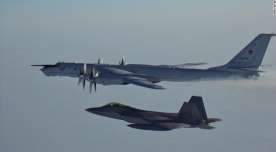US and Canadian jets intercept Russian reconnaissance aircraft off Alaska

US F-22 stealth jets and Canadian CF-18 fighters intercepted two Russian reconnaissance aircraft while they were flying off the Alaskan coast on Monday, according to North America Aerospace Defense Command.
The intercept comes amid ongoing tensions between the US and Russian militaries as US officials have expressed concerns about increased Russian military activity in the Arctic.
The two Russian Tu-142 maritime reconnaissance aircraft entered the Alaskan Air Defense Identification Zone on Monday but did not enter US or Canadian airspace, remaining "in international airspace over the Beaufort Sea, and came as close as 50 nautical miles to the Alaskan coast," according to North American Aerospace Defense Command, known as NORAD.
The Russian planes flew in the Alaskan Air Defense Identification Zone for about four hours.
US and Canadian aircraft routinely intercept Russian military aircraft in the area as part of the command's efforts to secure North American airspace.
The Russian aircraft entered the zone north of Alaska. NORAD fighter aircraft escorted the TU-142s for the duration of their time in the zone. The Russian aircraft remained in international airspace over the Beaufort Sea, and came as close as 50 nautical miles to the Alaskan coast. The Russian aircraft did not enter United States or Canadian sovereign airspace.
Russian aircraft will operate in the area as part of their training efforts and have in the past flown nuclear-capable bombers into the area, prompting similar intercepts by US aircraft.
"NORAD employs a layered defense network of radars, satellites, and fighter aircraft to identify aircraft and determine the appropriate response," NORAD said in a statement.
The US and Canadian jets were supported by a KC-135 refueling aircraft and an E-3 Airborne early warning and control plane.











